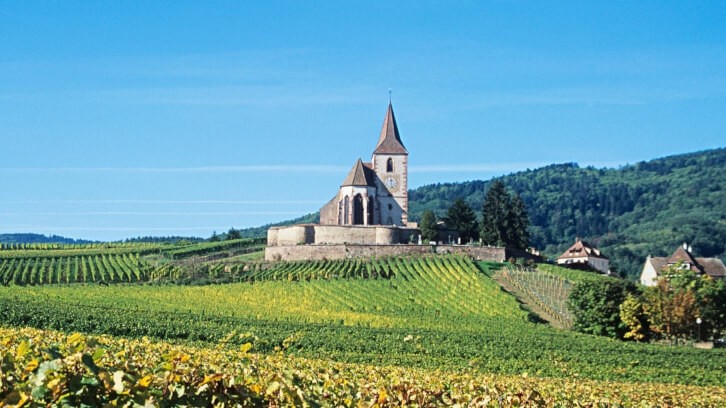Organic winegrowing in France ‘a very positive trend’

France is the European leader for organically farmed vineyards; with around 20% of the country’s vine area farmed organically (and that’s with France being the second largest wine producer in the world for overall wine), according to the latest figures from French organic agriculture organization, AgenceBio.
In 2021, certified vineyard area in France totalled 90,300 hectares: a 13% rise on 2020, with 69,600 hectares in the conversion.
The industry saw revenue top 1.2 billion euros, up more than 9% on 2020, thanks to strong demand in both France and from export markets.
Five regions account for 79% of marketed volumes: Languedoc-Roussillon, Rhone, Bordeaux, Provence and Corsica.
In France, 36% of consumers say they consume organic wine regularly or occasionally: more than twice as many as in 2015 when this figure was 17%. These figures are likely to continue to rise as consumers of organic wine tend to be younger than the average wine drinker.
Health and environment
Having grown consistently over recent years, ‘Organic’ benefits from being a label that most consumers now know and recognize and associate with environmental and health benefits.
France is Europe’s largest consumer of organic products, with 53% saying they buy organic food often. In fact, organic products have a 7% market share of the market.
However, the rest of Europe is not far behind, with 48% of consumers saying they buy organic products often.
77% of Europeans believe it is important to know the source of products they buy; while 63% believe organic products are healthier.
“In the context of an increased importance of environmental concerns, the leading factor in consumption is, above all, the carbon footprint of organic wine, considered by some 61% of Europeans as more environmentally friendly," notes Millesime Bio, a trade show in France dedicated to organic wine, drawing on figures from a 2021 Ipsos study.
"Consequently, among the primary motivations for consuming organic wine, 58% of German consumers, 54% of French consumers and 50% of British consumers mentioned the environment.”
However, a wider range of motivations have emerged over the last few years.
“The fair trade aspect of organic production, which is known to create more jobs than conventional methods, is a major motivation for 35% of Europeans.”
Consumers are willing to pay more for organic products
Consumers have been – at least to date – willing to pay more for organic wine. 2021 figures show that the average price for a bottle of organic wine in France is 14 euros, compared to 11.70 euros for a non-organic bottle.
This is reflected across Europe: with consumers spending, on average, 13.90 euros on an organic wine, compared to 11 euros for a non-organic wine (in 2015, that gap was just 90 centimes).
Although data for the most recent months is not yet available, there is not yet any indication that inflation and a cost-of-living crisis has hit organic sales.
In fact, the UK's Soil Association said in February that organic sales had risen for the 11th year in the row in 2022 - although it acknowledged the impact of inflation, it championed 'amazing momentum' for the category and noted that economies of scale could help bring down prices in the long term.
“This dynamic is probably connected to debates about fair pay for producers and, more widely, with the acceptance of paying more to consumer better," notes Millisime Bio.
"Today, 63% of Europeans are willing to pay more for products that help protect the environment, compared to 57% in 2015.”
Organic also benefits from being one of the most known and recognized endorsements, having been growing in popularity over recent years. In fact, 96% of French consumers recognize an organic endorsement: compared to just 39% for France’s ‘Haute Valeur Environnementale’ (high environmental value) certification or 18% for demeter.
“From the perspective of European consumers, organic endorsements rank higher for major criteria such as non-use of synthetic chemicals, respect for the environment, safeguarding health and the reliability of inspections, as with as for the aroma and flavor profile.”
Organic wine, at its base, is produced without the use of any synthetic chemicals or GMOs (genetically modified organisms). The use of mechanical product methods and prophylactic measures are used to reduce the sensitivity of vines to attacks by parasites, to control weed growth, improve soil fertility and favor biodiversity.
It has been covered by EU regulations since 1991: most recently with 2018/848 pertaining to organic production and labelling of organic products, which came into effect on January 1, 2022. This specifies applicable rules for production, processing, distribution, import, inspection, certification and labelling of organic products; with the most recent regulation seeking to harmonise practices between member states, provide a better framework for inspections and to make compliance with European specifications the rule for trade with non-EU countries.
For vineyards, there is a mandatory three year conversion period before an organic endorsement can be displayed (from year 2, the vineyard can use the statement ‘wine converting to organic farming’).
D2C drives sales
Organic wine has also benefited from a drive in direct-to-consumer sales. This distribution now represents 46% of organic wine sales (by value) in France.
Wine shops make up 24% of sales; supermarkets 20%, and organic specialists 10%.
However, it is not just French sales which are important to the category. France - already a large wine exporter - has also seen organic wine become popular with export destinations - exports of organic wine accounting for around 42% of total organic volumes.














